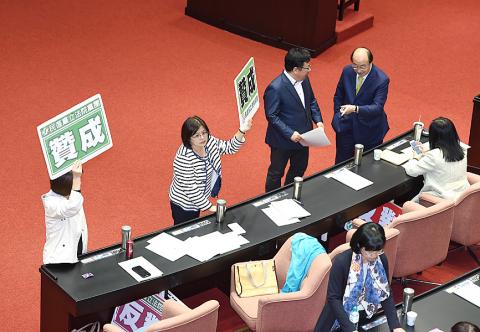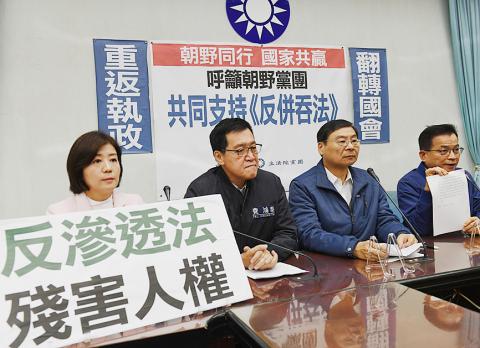The Democratic Progressive Party (DPP) caucus’ version of an anti-infiltration bill yesterday advanced to a second reading and discussion in additional cross-caucus negotiations.
Prior to yesterday’s legislative meeting, DPP caucus members were guarding the speaker’s podium to ensure that the caucus filed motions first.
The caucus sponsored a motion to advance the bill to a second reading, which was not met with any objections, as no Chinese Nationalist Party (KMT) legislators were present.

Photo: Fang Pin-chao, Taipei Times
DPP caucus whip Ker Chien-ming (柯建銘) then filed a motion to have the anti-infiltration bill returned to the legislature’s Procedure Committee for reconsideration — a practice frequently used by the caucus whip of the ruling party during the review of a major bill so that the caucus’ resolve to pass the bill can be reaffirmed.
Ker’s motion was voted down by other caucus members, as well as the three remaining New Power Party legislators — Huang Kuo-chang (黃國昌), Hsu Yung-ming (徐永明) and Jang Show-ling (鄭秀玲) — who apparently vetoed the motion to show support for the bill.
The bill advanced to a second reading without any objection, pending further deliberation during cross-caucus negotiations, which are to be arranged by the DPP caucus, Legislative Speaker Su Jia-chyuan (蘇嘉全) said.

Photo: CNA
On Monday, the DPP caucus unveiled the bill, which would subject those who disrupt the social order under the command or at the request of “infiltration sources” to a prison term of up to seven years or a fine of NT$5 million (US$163,865).
The 12-article draft prohibits anyone from donating to a political party, influencing elections, proposing the recall of a government official or launching a public referendum on the instructions or with the financial support of an infiltration source.
At a news conference at the Legislative Yuan, the KMT caucus — which had unanimously boycotted the legislative meeting — unveiled a bill against annexing the Republic of China (ROC), which it said was meant to replace the anti-infiltration bill.
KMT legislators decided not to vote on the DPP’s motion on a second reading to prevent the DPP from posting the voting results online and portraying the KMT as siding with Beijing on Chinese interference, KMT Legislator Alicia Wang (王育敏) said.
The anti-annexation bill says that no civil servant of the ROC may advocate actions that would sabotage the nation’s political system, or change its official title or territory.
They must not make remarks that advocate decimating, absorbing or replacing the ROC, the bill states.
Civil servants — including the president — found to have contravened the bill would face a prison term of up to seven years, it states.
The anti-annexation bill is a more comprehensive bill than the DPP’s, as it would not only bar attempts to unify Taiwan with China, but would also prohibit attempts to make Taiwan a US state or part of Japan, as these are all actions that would eliminate the ROC, KMT Legislator Lin Wei-chou (林為洲) said.
The KMT caucus would demand that its bill be reviewed side-by-side with the DPP’s during cross-caucus negotiations, KMT caucus whip William Tseng (曾銘宗) said.

MAKING WAVES: China’s maritime militia could become a nontraditional threat in war, clogging up shipping lanes to prevent US or Japanese intervention, a report said About 1,900 Chinese ships flying flags of convenience and fishing vessels that participated in China’s military exercises around Taiwan last month and in January last year have been listed for monitoring, Coast Guard Administration (CGA) Deputy Director-General Hsieh Ching-chin (謝慶欽) said yesterday. Following amendments to the Commercial Port Act (商港法) and the Law of Ships (船舶法) last month, the CGA can designate possible berthing areas or deny ports of call for vessels suspected of loitering around areas where undersea cables can be accessed, Oceans Affairs Council Minister Kuan Bi-ling (管碧玲) said. The list of suspected ships, originally 300, had risen to about

DAREDEVIL: Honnold said it had always been a dream of his to climb Taipei 101, while a Netflix producer said the skyscraper was ‘a real icon of this country’ US climber Alex Honnold yesterday took on Taiwan’s tallest building, becoming the first person to scale Taipei 101 without a rope, harness or safety net. Hundreds of spectators gathered at the base of the 101-story skyscraper to watch Honnold, 40, embark on his daredevil feat, which was also broadcast live on Netflix. Dressed in a red T-shirt and yellow custom-made climbing shoes, Honnold swiftly moved up the southeast face of the glass and steel building. At one point, he stepped onto a platform midway up to wave down at fans and onlookers who were taking photos. People watching from inside

Japan’s strategic alliance with the US would collapse if Tokyo were to turn away from a conflict in Taiwan, Japanese Prime Minister Sanae Takaichi said yesterday, but distanced herself from previous comments that suggested a possible military response in such an event. Takaichi expressed her latest views on a nationally broadcast TV program late on Monday, where an opposition party leader criticized her for igniting tensions with China with the earlier remarks. Ties between Japan and China have sunk to the worst level in years after Takaichi said in November that a hypothetical Chinese attack on Taiwan could bring about a Japanese

STREAMLINED: The dedicated funding would allow the US to transfer equipment to Taiwan when needed and order upgraded replacements for stockpiles, a source said The US House of Representatives on Thursday passed a defense appropriations bill totaling US$838.7 billion, of which US$1 billion is to be allocated to reinforcing security cooperation with Taiwan and US$150 million to replace defense articles provided to the nation. These are part of the Consolidated Appropriation Act, which the US House yesterday passed with 341 votes in favor and 88 against. The act must be passed by the US Senate before Friday next week to avoid another government shutdown. The US House Committee on Appropriations on Monday unveiled the act, saying that it allocates US$1 billion for the Taiwan Security Cooperation Initiative